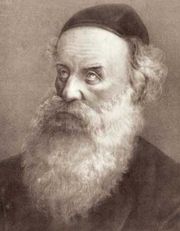5743 [1982-1983] – The Lubavitcher Rebbe, His Holiness, Grand
Rabbi Menachem Mendel
Schneerson . . . urges that Jews influence
non-Jews, "Noah's children," to observe their Seven Noahide
Commandments. He urges the enactment of "A Moment of
Silence" at the beginning of the school day in schools all
over the world so that youth be aware of and influenced by the
"Eye that sees and the Ear that hears." [Subsequently, the
Rebbe revised this suggestion to be a petition by children
only.]
In line with
this, he suggests a petition campaign by voters directed at influential
elected officials in the United States (and throughout the
world) so that they realize the importance of enacting such
legislation. The petition would also urge government
assistance to parochial schools.
(from the Rebbe's biographical outline, page A23)
by His Holiness, Grand Rabbi Schneur Zalman of Liadi
translated from the Hebrew, with an introduction, by Rabbi Nisen Mangel, M.A.
The original English only edition is still available from the publisher
(Brooklyn, New York: Kehot Publishing Society, 1965, 1976)
Bi-Lingual Edition
The five parts of Tanya with Hebrew text and English translation
on facing pages is readily available
(Brooklyn, New York: Kehot Publishing Society, 1965, 1981; revised
edition 1984) (originally published by Soncino Press)
ISBN 0-8266-0400-5
LCC 84-82007
Translations have also been rendered into the following languages:
- Italian
- French
- Spanish
- Arabic
- Russian
- Portuguese
- German (only through Chapter 7)
- Yiddish
Chabad - khah BAHD; the name of the Hasidic philosphy and teachings in the tradition of the Lubavitcher Rebbes. This is an abbreviation for the Hebrew words Chochmah, Binah, Da'as (Da'at) – wisdom, understanding, and knowledge. Developed by His Holiness, Grand Rabbi Schneur Zalman of Liadi (a town in White Russia on the edge of Lithuania). He formally introduced this approach to traditional Judaism in his book the Tanya, first published in 1756-7.
Lubavitcher, Lubavitch - loo BAH vitch er, loo BAH vitch; a townlet in today's Belarus (White Russia) where the Rebbes made their homes for 102 years. Consequently, this townlet was a magnet for the Rebbes' disciples and their flocks. As with other Jewish institutions which relocated to the New World and Israel, the folk retained the name of the town/townlet of the Eastern European origin. I write 'flock' because the Rebbe is like a shepherd.
Rebbe - REH bee, REH beh (Grand Rabbi)
Sichos - SEE khus (a variation of the Hebrew word sichot)
Ma'amarim M'lukat - my MAHR im m' LUH ket, as pronounced by the students of the teachings of the Lubavitch movement/school of thought.
Shulchan Aruch - SHOOL khahn AW rookh; The Code of Jewish Law from the 16th century (1563-1570). Rabbi Joseph Karo (1488-1575) of Safed, Israel, gave this name to the Code. Its rulings have been accepted by Jews everywhere since the 16th century. The title literally means "Set Table." Karo composed this Code so that someone could "sit down" and expect to "consume a meal." Thereby, someone who sets themselves to study an appropriate ruling comes away satisfied with a clear ruling as one derives energy from a meal.
Likkutei Sichot - lee koo TAY see KHOHT
the Rebbe's Notebooks: Reshimot - reh shee MOHT, reh SHEE mess
